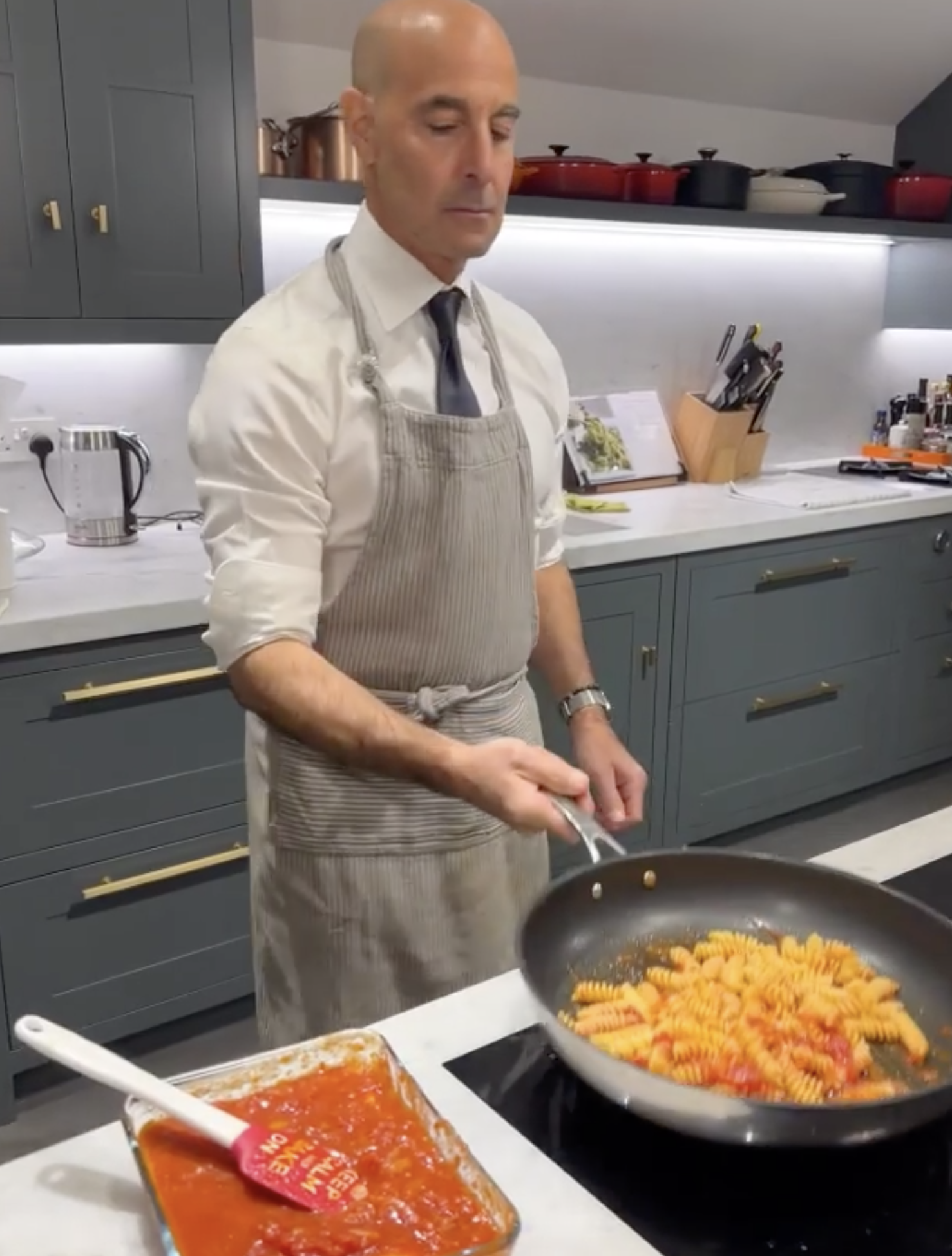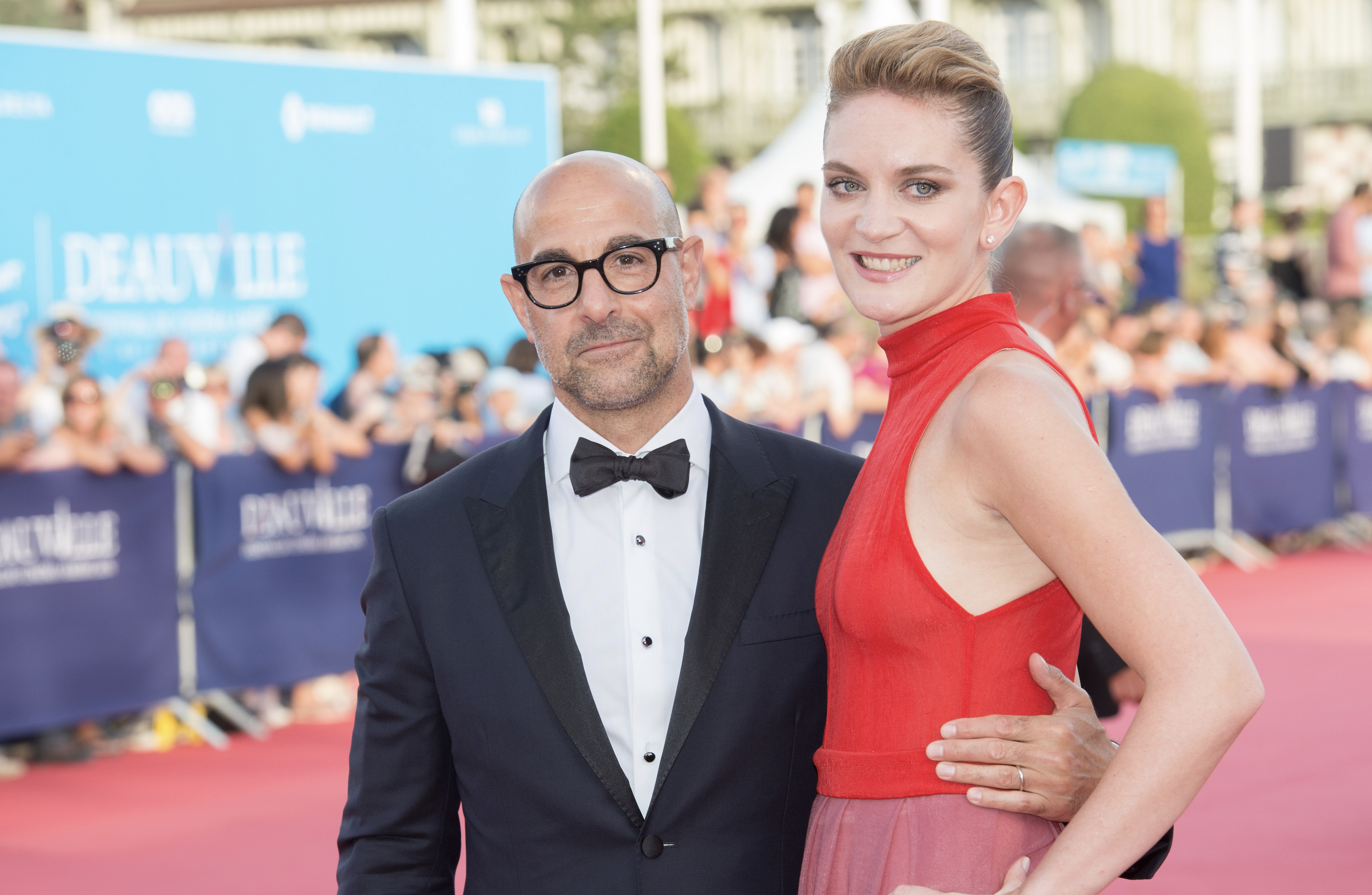Finding Joy in Food After Oral Cancer
- As many cancer warriors know, cancer can change your life. Actor Stanley Tucci, 62, a known food lover, knows that well.
- He said his oral cancer battle heightened his love for food and gave him a new appreciation.
- Still, he said his favorite snack is sometihng so pure and simple: a good ol’ peanut butter sandwich.
- Tucci, a father of five children, was diagnosed with oral cancer in 2017 when doctors discovered a 3-centimeter tumor at the base of his tongue.
- Cancer can occur both on the part of the tongue that is in the mouth, as well as the portion that is in the throat, where it can be harder to detect and may spread into the neck's lymph nodes.
- Having a partner, friend, or family member by your side to help care for and support you through a health struggle can help alleviate anxiety and depression as cancer treatments become more intense over time.
As many cancer warriors know, cancer can change your life. And actor Stanley Tucci’s battle with oral cancer was particularly hard on the food lover known for indulging in decadent cuisines.
But while his cancer battle may have deepened his passion for all kinds of food, his favorite snack is something so unexpected you may have the ingredients in your pantry right now.
Read More
View this post on Instagram
It’s great to see that Tucci is finding joy in the simplest of foods after beating oral cancer. While battling the disease, his sense of taste was affected, which he said left him with a new appreciation for food and eating.
"I think it heightened it,” Tucci shared with “The View” hosts on the impact cancer had on his love of food.
“I realized that the most important thing to me was food and through food, that’s the way I connect with people … to not be able to have that, I just wanted to, well, die. I thought what’s the point," he said during his recent appearance.
“If you have that taken away from you, it’s really scary,” he added.
Tucci's Oral Cancer Battle
Tucci, a father of five children, was diagnosed with oral cancer in 2017 when doctors discovered a 3-centimeter tumor at the base of his tongue. According to Entertainment Tonight, the famous actor was experiencing "extreme pain in his jaw."
"They couldn't do surgery because the tumor was so big. It's a miracle that it didn't metastasize (or spread to other parts of the body). It had been in me so long," Tucci told E.T.
"They had to do a high-dose radiation and chemo," Tucci said to Vera Magazine. His treatments involved 35 days of radiation and seven sessions of chemotherapy. This kind of treatment was something he was always leery about ever since his first wife, Kate, battled breast cancer until her passing in 2009.
"I'd vowed I'd never do anything like that," he said.
"To watch her go through those treatments for years was horrible," he added.

Stanley described his treatment as "brutal", and he said that it affected his diet, but the brave cancer warrior persevered.
"I lost 35 pounds. I couldn't eat. I had a feeding tube for six months and everything tasted like you-know-what and smelled like you-know-what. And it took months and months and months for me to finally be able to eat again and then taste properly again," he said.
A feeding tube helps people get the nutrition they aren’t getting through regular food. It’s a flexible tube that’s “inserted through the nose or belly area to provide nutrients by delivering liquid nutrition directly into the stomach or small intestine,” according to the Cleveland Clinic.
He said the stress of treatment nearly caused him to miss his children's graduation.
"I could barely make it to the twins' high school graduation," he said.
"Cancer makes you more afraid and less afraid at the same time. I feel much older than I did before I was sick. But you still want to get ahead and get things done," Stanley continued.
Tucci finished cancer treatments in 2018 and he regained his sense of taste. He says has since been "cancer free.”
Power of Support From His Wife
While making more media rounds, Stanley shared how supportive his loving wife, Felicity, was during his cancer battle.”
"I was so afraid. But Felicity was very insistent," he told Willie Geist on the “Today Show” of Felicity getting him to his treatments.
"She was incredible," he added.
It is important for cancer warriors during their fight to have a strong support system.
Having a partner, friend, or family member by your side to help care for and support you through a health struggle can be advantageous. It helps them alleviate anxiety and depression as cancer treatments become more intense over time.
Dr. Shelly Tworoger, a researcher at Moffitt Cancer Center told SurvivorNet that "there's a number of common things cancer patients can experience, such as anxiety, depression, financial toxicity, social isolation."
Knowing you have loved ones by your side at every step helps you process those emotions and cope with your new reality during your journey.

Many spouses and partners take on a caregiving role while their beloved cancer warriors are battling the illness. It's necessary to understand your loved one's diagnosis and assist them when following cancer-care instructions.
Dr. Jayanthi Lea, a gynecologic oncologist at UT Southwestern Medical Center, previously told SurvivorNet, "I encourage caregivers to come into visits with my patients because, in that way, the caregiver is also listening to the recommendations what should be done in between these visits, any changes in treatment plans, any toxicities [side effects] that we need to look out for, changes in dietary habits, exercise, etc."
If you are a caregiver of a cancer warrior, it is important to maintain your own mental and physical health as well. As Al Roker's wife admitted, caring for a loved one after a diagnosis can take its toll.
"Caregiving is the most important job in the universe because you are there through the highs and lows," Julie Bulger manager of patient and family-centered care at Vanderbilt-Ingram Cancer Center told SurvivorNet.
"You are there to support your loved one, to manage all of the daily tasks as everything is changing in your life," Bulger added.
Caregivers must also watch out for "caregiver burnout" where stress, anger, fatigue, and illness emerge from putting another person's needs ahead of their own.
Caregivers who find themselves struggling to care for a cancer warrior should seek out a therapist, or a support group of their own either online or in person.
Understanding Tongue Cancer
Tongue cancer is relatively rare but can still be deadly, according to the National Cancer Institute. While there were only 18,040 new cases of the disease in the United States in 2023, making up less than 1% of new cancer diagnoses, tongue cancer is estimated to claim 2,940 lives.
WATCH: Being a cancer caregiver can feel overwhelming.
Cancer can occur both on the part of the tongue that is in the mouth, as well as the portion that is located in the throat, where it can be harder to detect and may spread into the neck's lymph nodes, according to the Mayo Clinic.
While surgery is often required to remove the cancerous cells, other treatments include chemotherapy, radiation, and targeted drug therapies. If the cancer is advanced, some of these treatments can affect a patient's ability to eat or speak, though it's possible to regain those functions through rehabilitation therapy.
Though not all tongue cancer is caused by the human papillomavirus (HPV), the most common sexually transmitted infection in the United States, there is a link.
"From the 1980s to the 2010s, the rate of HPV-related head and neck cancers has gone up by 300 percent," Dr. Ted Teknos, a head and neck cancer specialist, and president and scientific director of University Hospitals Seidman Cancer Center in Cleveland, Ohio, told SurvivorNet during a previous interview.
More on Oral Cancer
Symptoms and Risk Factors for Mouth Cancer
Stanley Tucci's cancer journey helps remind us to be aware of our body and act when something doesn't feel right.
Risk factors for developing mouth cancer may include tobacco and heavy alcohol use, excessive sun exposure to your lips, human papillomavirus (HPV), or a weakened immune system.
Here are some reminders for common symptoms and risk factors from Mayo Clinic for oral cancer.
- A lip or mouth sore that doesn't heal
- A white or reddish patch on the inside of your mouth
- Loose teeth
- A growth or lump inside your mouth
- Mouth pain
- Ear pain
- Difficult or painful swallowing
While these symptoms may not mean you have mouth cancer, it's important to take note of any changes to your body or health and to discuss them with your doctor.
Learn more about SurvivorNet's rigorous medical review process.

